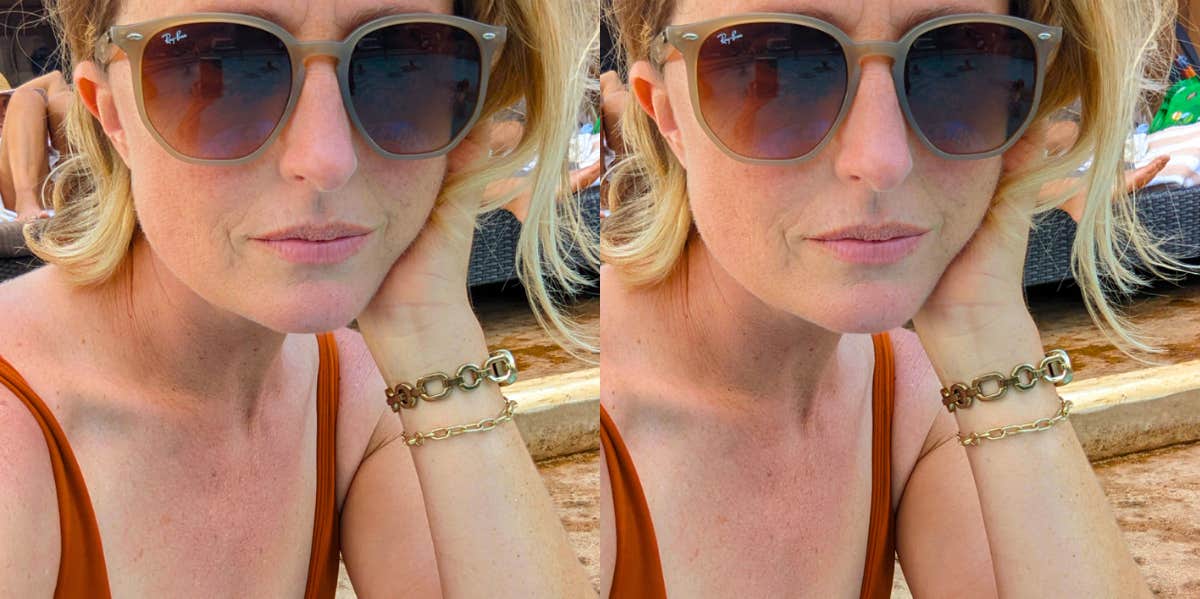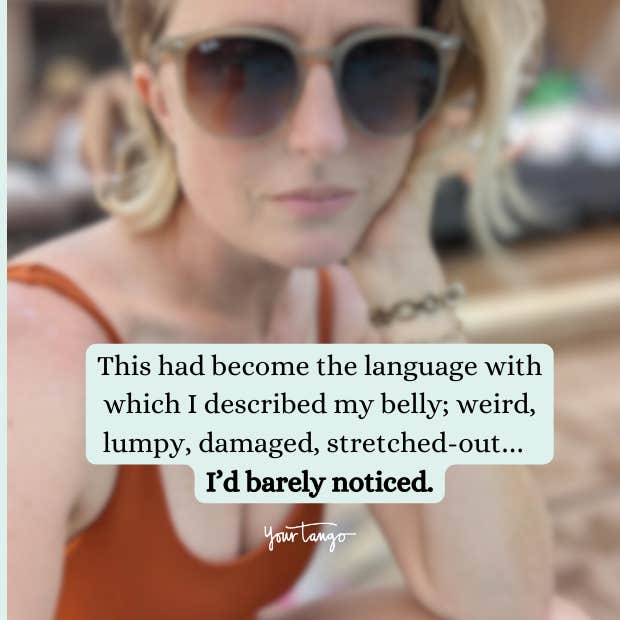How I Learned To Embrace My Imperfect Belly & Wear Tiny Bikinis Again
There’s nothing weird about wanting to feel sexy, to sun your flesh, to wear as little as possible.
 Courtesy of the author
Courtesy of the author A few years ago, I declared the bikini to be dead.
I declared this for myself, not the world. I didn’t necessarily say it out loud, but it wasn’t just a wandering, random thought. It was a line drawn in the sand. Bikinis are over.
After three babies, my belly felt too squishy and misshapen to be seen by the public. As a 45 year-old woman, breaking up with the bikini almost seems like a natural development. You wear bikinis as a teen and in your twenties, not in your 40s after having babies and aging in the ways most of us do.
When I told a friend I was off bikinis, she asked why. She, also in her mid-to-late 40s, asked this while wearing a bikini, her thin stomach layered with crepey skin. Before I thought it through, I said, “Nobody needs to see this,” while grabbing a roll of fat on my belly. As pathetic as it sounds now, I was laughing as I said it because it felt normal.
This is how women talk about our bodies, right?
The secret language of women: “My body is terrible!” No it’s not, you’re so cute!, your friend might say. “No, you’re totally cute, I’m not aging as well as you,” you’ll reply. No, you’re aging so well, I’m a mess! she’ll say.
And so we did that for a few minutes, until my son walked by and said, “That’s weird, Mom."
I grimaced. I wouldn’t have said it if I’d known one of my children was close. I don’t want them learn from me how to talk badly about somebody’s body (or their own). I don’t want them to know I think these things about myself. I’m not that person.
That should’ve been my first warning that leaning into my instinct to “protect” people’s delicate eyeballs from my normal flesh was not a great thing, but apparently I wasn’t paying close enough attention. This had become the language with which I described my belly; weird, lumpy, damaged, stretched-out … and I’d barely noticed.
 Photo Credit: Author, Joanna Schroeder
Photo Credit: Author, Joanna Schroeder
To be clear — because it does matter — I am a size 6.
That means that I have immense body privilege due to being smaller than the average American woman. Nobody insults me or degrades me when I wear a bikini in real life, the way they may (and often do) with fat women. I don’t experience systematic oppression due to my body size, nor do I have doctors who ignore actual medical issues due to my body.
That doesn’t mean I walk around feeling great all the time, of course. That’s not how humans work. I don’t sit around thinking, “There are women bigger than me!” because I don’t think about other people’s bodies the way I think about my own.
I delight in other people’s bodies, in their curves and shapes and colors; in their choices of swimsuits and hairstyles and nail art. I’ve been a feminist long enough to be able to look at a woman and see many of the complicated social and political forces that may be at work behind anything she wears, says and does in a public place.
Except, apparently, myself.
That changed when, one day, I looked at my daughter and saw her long torso and muscular little frame, her beefy little muscular arms.
She’s built like me, I thought. The realization came in two flavors: delight (I’m pretty cute) and horror (ugh, my body) all at once.
Looking at her, I realized that this body is a family legacy. Instead of becoming frail as we age, we grow sturdier. It’s a good thing: good bone density, good muscular tone. My mom, in her 70s, still throws a bag of bark for ground cover over her shoulder and hauls it up the hillside when she’s gardening.
When I looked at vacation photos from last year, I saw the only bikinis I’ve been wearing: big, blocky ones — high-waist bottoms and long-line tops, only an inch of skin showing — and they were not cute. Worse, I didn’t look like me in them.
I have a very sexy one-piece from Left On Friday that I think looks fantastic, but those big bikinis and one-pieces that I was calling “classic” actually made me look (and feel) worse. They reminded me of the shame I felt growing up in a town that wanted to keep me quiet and dull my light.
Looking at my daughter, my hypocrisy hit me hard.
I don’t want her to feel limited by some external definition of what her body can do. I want her to wear what makes her feel good. Of course, if those conservative one-piece swimsuits had made me feel good, I would’ve stuck with them. But the classic tank suits with “shaping” fabric were remnants of a nasty old bandage I’d long ago decided to rip off. They had to go.
I’m a bikini girl — a skimpy bikini girl.
I loved bikinis well before my mom allowed me to wear them. I begged for them when I was 10 and 11 and 12 and 14, even though I got a big “no” every time I asked.
If you grew up somewhere other than an Evangelical town in the Midwest, you might be shocked that an innocent child was denied a bikini, but this was basic good parenting in the late 80s and early 90s in our community.
Once I turned 15, I was allowed to get a bikini or two — but they had to be inspected for propriety by my mother. Again, totally normal stuff. I’m sure it felt even more important given that I was that girl who set off my community’s alarm bells pretty much from the moment I could walk and talk.
As soon as I got my freedom, I bought the skimpiest bikinis I could find. A decade or so ago, I would’ve blamed insecurity or a desire for male attention for this, buying into a type of puritanical, slut-shaming binary I’ve watched many former Evangelicals fall for, even the ones who’ve done therapy and become feminists. Now I know that’s BS.
There’s nothing weird about wanting to feel sexy, to sun your flesh, to wear as little as possible.
Discovering that I still like skimpy bikinis at age 45 puts that “addicted to male attention” theory to rest.

These days, male attention is the last thing I’m looking for — particularly from any man I’m not romantically involved with. Still, I buy the bikinis I want, regardless of how much coverage they offer.
This raises my biggest question, one you’ll have to drop all preconceived notions of propriety for. You’ll need to zoom out and pretend to be a sociologist from a foreign culture looking in at us and our habits in order to truly understand what I’m getting at.
Why would it be appropriate for a 19 or 21 year-old to wear a skimpy bikini, but not a 45 year-old, grown woman who knows who she is and what she wants?
Why is the body of the person who has moved one million directions throughout this life, whose body birthed and fed three babies, whose body has been very sick and recovered, the one we are trying to hide? Why in the hell wouldn’t that body — pale and scarred and lumpy in places — be worthy of being seen?
I suspect it's because it's no longer a male fantasy. If you don't exist to be consumed, you don't really exist.
I’m a mother now, no longer allowed to show skin or be a sexual being. My body is no longer public property, it’s my husband’s or my child’s. My body is no longer worn like a red carpet gown — solely to be seen — and therefore it must be hidden.
In addition, we all grew up in this society and therefore looked at that bigger body or that stretch-marked belly or those dimpled rolls or bulges and often thought “ew” because that’s what we were told to think.
Maybe you heard “ew” from your family or your friends. Maybe you thought you were being objective or even benevolent when you thought, “That is not the swimsuit for her.” Maybe you believed it because you thought it was the only thing to believe, an objective truth. But it’s not. And you don’t have to believe it now.
I’ve stopped believing it.
And so, when my daughter spotted a bikini at Target that looked just like one of hers, I bought it. Her delight at the idea of us matching was impossible to refuse. When she begged me to wear it to a friend’s pool, I did so hesitantly at first. Ugh, this body, I thought.
But when I wore that bikini for the first time, matching with my little girl, I saw myself as she sees me. Worthy.
All of this reminds me of a viral essay from 2013, The Mom Stays In The Picture, which changed my perspective on motherhood and identity.
"I'm everywhere in [my children’s] young lives, and yet I have very few pictures of me with them. Someday I won't be here — and I don't know if that someday is tomorrow or thirty or forty or fifty years from now — but I want them to have pictures of me. I want them to see the way I looked at them, see how much I loved them. I am not perfect to look at and I am not perfect to love, but I am perfectly their mother.
"When I look at pictures of my own mother, I don't look at cellulite or hair debacles. I just see her — her kind eyes, her open-mouthed, joyful smile, her familiar clothes. That's the mother I remember. My mother's body is the vessel that carries all the memories of my childhood. I always loved that her stomach was soft, her skin freckled, her fingers long. I didn't care that she didn't look like a model. She was my mama."
Before that article, I had accepted that being a mom meant becoming invisible.
Nobody told me that I was supposed to disappear from photos or into the background of life. Nobody had to tell me.
I had stepped out of the frame — in photos and in life — and I stepped back in after I read that.
The disappearing happens to us so slowly, we don’t even feel it happening.
We may say it’s because the kids are the center of attention now, but it’s more likely we’re saying, “This body doesn’t deserve to be documented."
Ultimately, I bought that “first string bikini after baby” for my daughter. But I’ve bought a few more recently for me.
I want her to see that I’m OK with my body. I want her to see me in a string bikini and a cheeky bottom just like I used to wear because I want her to know that my body is good — that her body is good, no matter what.
I also do it for my sons, because I never want them to get the message that there are bodies — any bodies — that shouldn’t be seen. As they say on the internet, all bodies are beach bodies if you’re at the beach. All bodies are bikini bodies if you’re wearing a bikini.
In the few months I’ve been wearing the bikini I bought to match my daughter, something has changed.
I like my body.
Maybe that’s arrogant, but for me it’s a tiny coup. My belly has fat on it, it is dimpled and stretched and loose and I like it. I like being in my body — especially in a string bikini — and I believe it deserves to be shown the way I want to show it.
Joanna Schroeder is a parenting writer and media critic whose writing has appeared in The New York Times, The Boston Globe, and more. She is co-author of the upcoming book Talk To Your Boys from Workman Publishing.
